Every coffee lover can put his signature under the phrase said by Voltaire: "If coffee is a poison, then I myself have been dying from it for more than half a century."
Useful information
Without this naturally invigorating drink, very many inhabitants of the adult population of the planet cannot imagine the beginning of the day. Chatting over a cup of coffee is a great way to lift your mood. Real coffee lovers prefer to drink a natural drink prepared in a coffee machine or a Turk. No instant or, even worse, coffee drink!

History
Many have heard of coffee varieties such as Arabica, Robusta, Liberica. The most famous is Arabica. Until the 20th century, only this variety was known throughout the world. Its homeland is Ethiopia, the coffee tree has the scientific name Coffea arabica. This variety has been known since VI and was also grown in Yemen. The tree grows at an altitude of 2000 m, on volcanic and mountain slopes. Plain coffee is believed to contain more caffeine.
After the rainy season, the coffee tree begins to bloom, and it takes 9 months for the fruit to ripen. Therefore, there can be flowers and fruits on the tree at the same time. This circumstance forces you to harvest by hand so as not to damage the flowers. For example, in Brazil, special tools are used for harvesting, with the help of which they shake coffee fruits from trees to the ground.
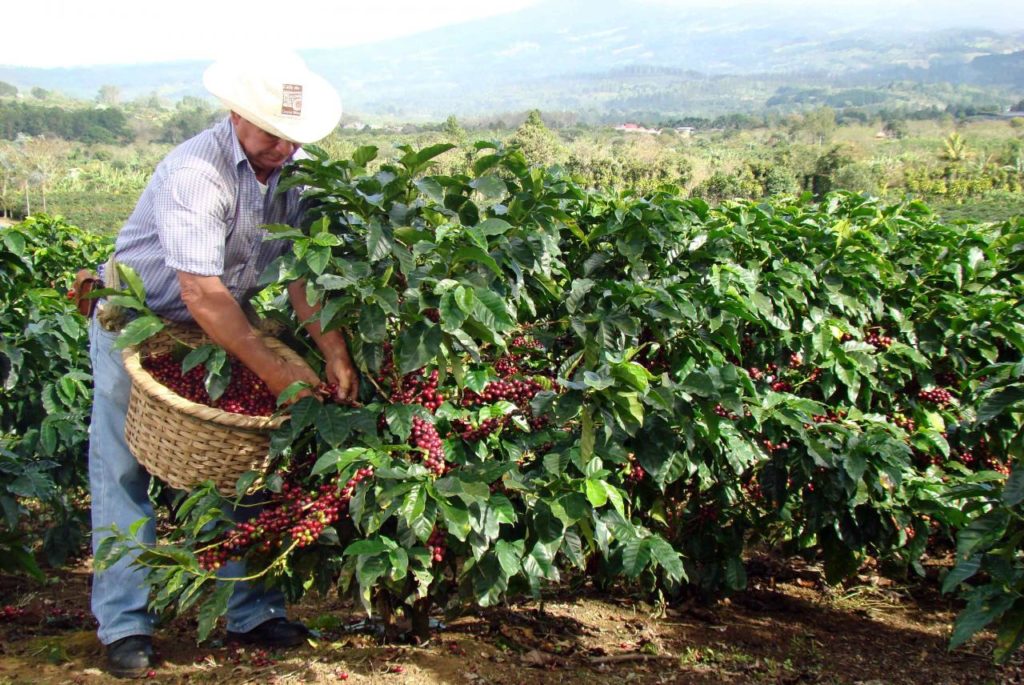
After that, they are raked and cleaned of debris. The productivity of coffee is low, only 1 kg of fruit can be harvested from one tree. Trees do not tolerate low temperatures and are very susceptible to pests. Various preparations are used to destroy them, this increases the costs of growing, which entails an increase in the cost of the final product. As a result of selection, more resistant specimens were obtained.
The taste of the final beverage is influenced by the handling and transportation of raw materials. For example, after long-term transportation in hot weather, the taste may change for the worse. Therefore, the proximity of the seaport also affects the quality characteristics of coffee.
The number of Arabica species reaches five dozen.
The main types of arabica
The taste of different types of coffee depends on the climatic characteristics, the collection and subsequent processing of the beans.
- Bourbon is the most similar to the very first in the world, cultivated in Ethiopia over 1000 years ago. The name of the species is derived from the place of origin - Bourbon Island (now French Reunion). The best varieties in Latin America come from this species. Yellow bourbon grows high in the mountains of southeastern Brazil. The variety does not undergo any crossing, its fruits have a thin shell, which helps the grains to dry right on the branches. Ripe grains have a yellowish tint - this is reflected in the name. The variety is considered the best, has a balanced and rich taste.
- Half of all coffee grown in Brazil is Bourbon Santos - the standard of coffee taste. The drink has a delicate chocolate aftertaste. For the first 4 years, the trees bear very small fruits, but the coffee from them is very high quality with a mild aroma. Several varieties of Arabica are grown in Brazil. This species is a small grain with a high percentage of caffeine and a nutty flavor.
- Jamaica Blue Mountain is elite and expensive.Plantations cover the slopes of the Blue Mountain of Jamaica. Coffee has a mild taste with the aroma of rum, which appears from the fact that, according to tradition, grains are usually transported in wooden barrels from under this drink. This variety is especially popular in Japan. 80% of the crop is delivered to this country.
- Nepal Everest Organic is a rare and exclusive one. A plantation of coffee trees appeared in 1994 in Nepal, favorable conditions were created for them. The drink has a tart taste with sourness and nutty flavor.
- Kopi Luwak is a very expensive, unique coffee. It is grown in Indonesia, as well as on the islands of Java and Sumatra. Prepared coffee has a unique caramel aroma with chocolate notes. The unusual thing is the way the grains are processed. They pass through the stomach of local animals, luvaks, are processed with civet. Animals select fruits of one ripeness and eat them, then they naturally come out.
- On the island of Sumatra, coffee trees are grown, the fruits of which are distinguished by their strength and aroma. The smell has astringency and a bready taste. The grains are dry processed in the open air, and the shell is cleaned by hand.
- In Kenya, the slopes of Kilimanjaro are ideal conditions for the cultivation of premium grains. Taste depends on the degree of roasting, therefore, it is usually sold green, so that everyone can get their own taste.
- In Ethiopia, two types are noted: Yorgachef with a delicate aftertaste and wine aroma and Harar with a taste that depends on the place of cultivation and storage method, it can be fruity or spicy.
- The oldest variety of mocha coffee grows in the mountains of Yemen. This is an elite species, it is in great demand, although the grains themselves are small and broken.
- An elite type of Arabica grows in Hawaii, one of the popular premium class.
- In Peru, in the Andes, fruits labeled "organic" are grown, there are no chemicals added to the soil. The drink has a light aroma with fruity notes.
- In Zambia, grains are harvested of arabica of the Lupeli type, with the taste of caramel, bitter orange, herbs.
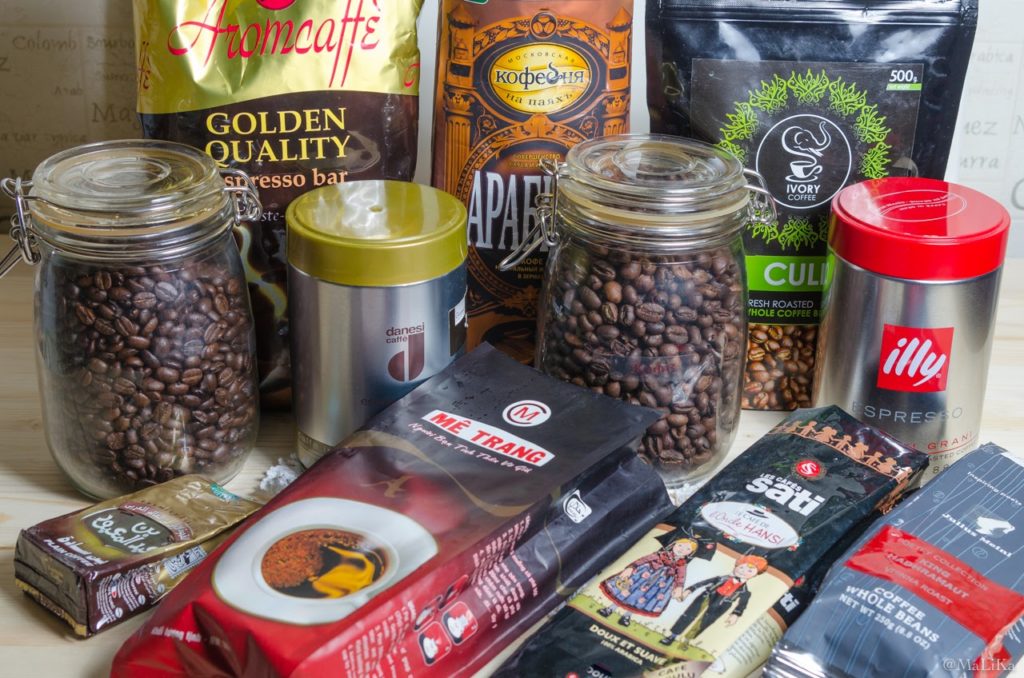
The vast majority of commercially available coffee beans are a blend of 80% Arabica beans. 100% is a delicate sour taste due to the low caffeine content.
Benefits of Arabica
In the total volume of coffee exports, arabica is 70%. Why is this variety more popular than Robusta? Here are the highlights:
- Bright, refined taste with different aromas, depending on the place of growth;
- Low caffeine content;
- Bitterness is not pronounced;
- The drink has a long-lasting sweet, nutty aftertaste.
The two main varieties differ in how they are grown. Robusta is considered a wild variety, as it does not require special care. Arabica requires human participation in the ripening and harvesting process. Coffee trees of this variety grow at an altitude of up to 2000 m, and robusta grows in lowlands, their trees are up to 6.5 m high, in Arabica coffee trees grow up to 4.5 m high.
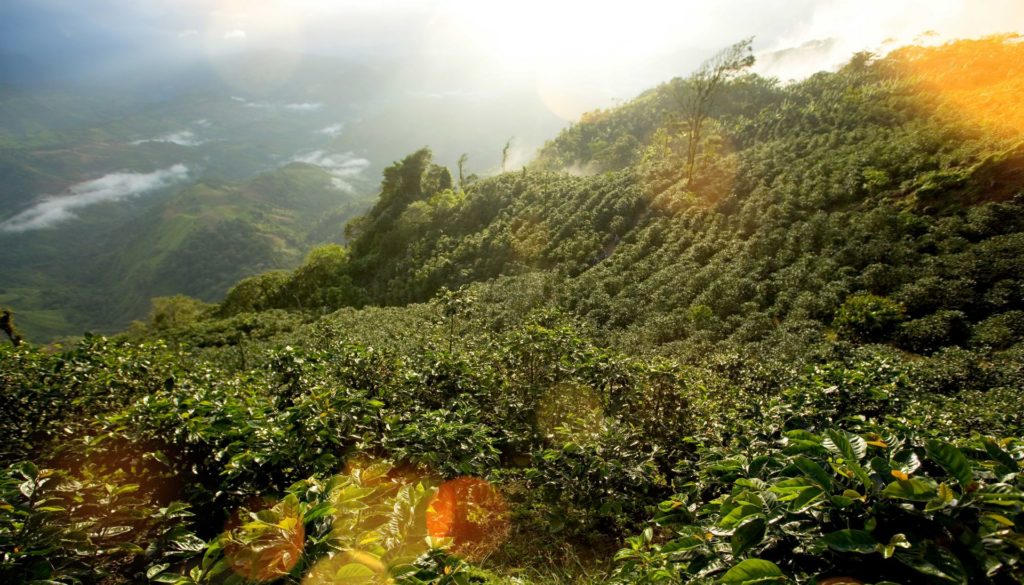
In Arabica, the grains are oval, and in Robusta, the fruits are smaller, round.
When choosing Arabica, you need to pay attention:
- to the country of origin;
- what aromas accompany the prepared drink.
For example, African Arabica has a multifaceted taste: tropical fruits, grapes, spices, caramel. For the maximum taste of coffee, it is necessary to brew freshly roasted beans, and it is advisable to purchase it from the manufacturer, and not in the supermarket.
About storage and degree of roasting
Green beans are recommended for long shelf life. Without processing, such coffee can be stored for up to 2 years. Exposure to temperature speeds up chemical processes.
The degree of roast affects caffeine levels and the release of essential oils. There are 5 steps:
- light or Scandinavian;
- medium;
- medium dark;
- dark;
- strong.
Light roasted coffee beans
With this method, the grains are heated at 180 to 250̊ degrees for 2 to 5 minutes and become yellowish or light brown in color. The fruits lose some of the moisture, and the sucrose turns into caramelin.
Light roasts include:
- Cinnamon (Cinnamon roast) - usually cheap varieties, the milled beans are brewed right in the cup, the drink has a herbal aroma, astringent, sour;
- New England roast is intended for brewing in a cup, French press, sour taste;
- American (American roast) can be brewed in a coffee machine, has a slight taste;
- City (City roast) is suitable for the coffee machine. The taste is lightly roasted, caramel.
"Excelso"
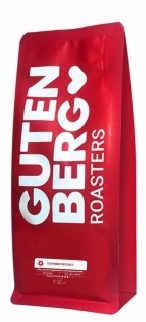
Colombian coffee, grown on the slopes of the Cordillera at an altitude of 1350-2000 m. Excellent balanced taste with moderate sourness and bitterness. Excelso lives up to its name, because it is translated from Spanish as excellent.
Colombian grains are sorted by size. The Excelso variety is slightly less than the supremo, and the taste is no different.
Roast: American, nutty caramel drink with chocolate notes.
A package with a valve weighing 1 kg costs 1900 rubles.
Advantages:
- Excellent mild taste with light bitterness;
- Can be brewed in a Turk, coffee machine, geyser coffee maker.
Disadvantages:
- not.
"Nairobi"
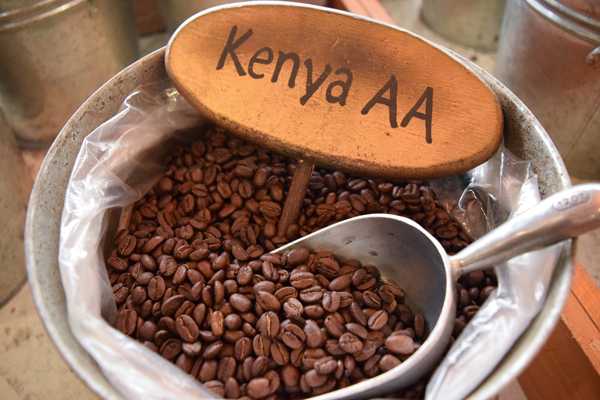
Kenyan coffee was recognized not so long ago, about 100 years ago it began to be grown. During this time, local Arabica has won recognition in many countries due to its high quality. For trees in Kenya, the ideal conditions: fertile soil, moisture and warmth. Crop is harvested by hand, sorted. The grains are sold at auction.
Quality is monitored by the Kenyan Coffee Department. Only large grains are exported, so buyers can be sure of the quality. On the palate, there is a sour citrus and currant aftertaste.
Coffee can be purchased from the online store in various weights. Average price from 340 to 640 rubles. per 100 g
Advantages:
- Excellent quality;
- Choice of quantity.
Disadvantages:
- High price.
The Jardin coffee brand is produced by the St. Petersburg company Orimi Trade, a representative of the Swiss factory Jardin Cafe Solution S.A. The quality is at a high level, due to which the drink has gained wide popularity.
Jardin Café Eclair
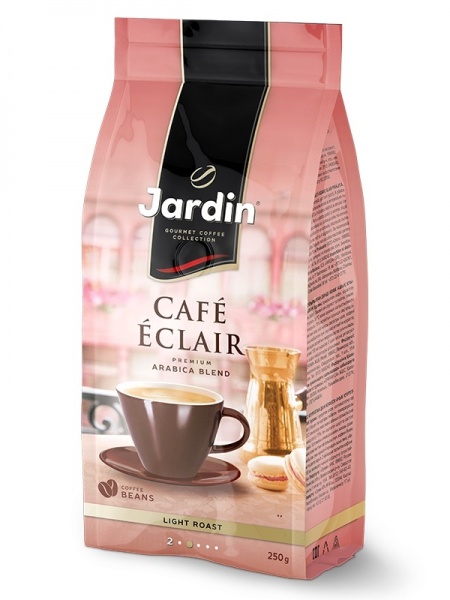
Selected Arabica beans from Honduras, Brazil, Colombia. Light roast gives biscuit notes, exquisite aroma. The quality of roasting is monitored by an automatic control system.
The grains are sold in a beautiful package of 250 g, price 246 rubles.
Advantages:
- Quality roast;
- Balanced taste;
- Price.
Disadvantages:
- not.
Medium roast
The grains then acquire a dark color with an oily surface. Full City Roast includes full city and Viennese. Brewed coffee has a bright sweet and sour aroma.
Cafecom Galapagos Gourmet
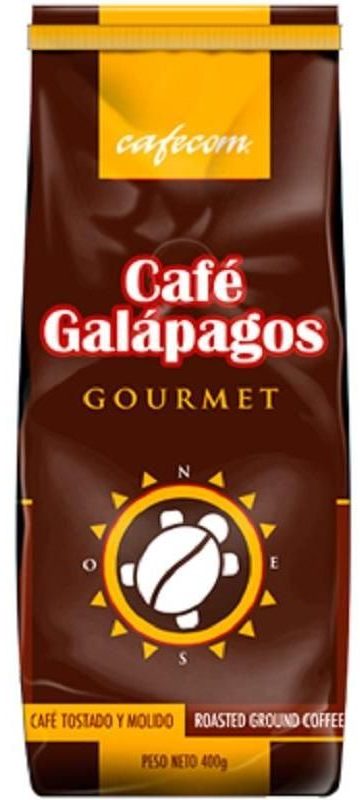
Ecuadorian coffee is grown in the Galapagos Islands (nature reserve) at an altitude of 300-400 m above sea level on ecologically clean soil. This rare variety is under the protection of UNESCO, as an endemic plant (growing in a certain area).
Rich, balanced taste with light sourness and long aftertaste of citrus, mountain flowers, spices. The ground beans can be used to prepare a drink in a Turk, a geyser coffee maker, a coffee machine, or a French press.
Vacuum packing with a special valve. 400 g costs 1480 rubles.
Advantages:
- unique taste;
- vacuum packaging.
Disadvantages:
- high price.
Qualita oro
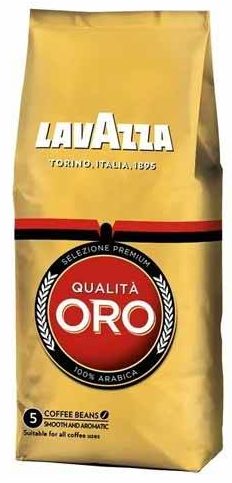
A "golden blend" of selected coffee beans from Central America and Brazil. Brewed coffee has a floral and fruity aroma. The taste is persistent and sweet with a slight sourness.
Vacuum packaging with a valve. Price for 1 kg - 1190 rubles.
Advantages:
- pleasant soft taste;
- high-quality roast.
Disadvantages:
- not.
Blue mountain
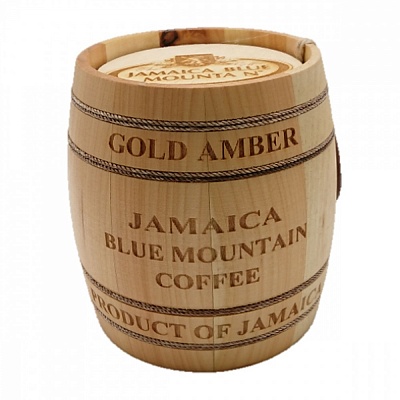
The coffee trees grow on the slopes of the Blue Mountain in Jamaica and are considered the tallest growing. The plantations are surrounded by fruit orchards. Ripe fruits are harvested several times a year as they ripen. The finished drink has a delicate taste with fruity and nutty notes.
The variety is considered elite; for long-term preservation, grains are subjected to slow heat treatment.
The grains are sold in a vacuum package with an air release valve, and are packaged in barrels. The price of 1 kg can go up to 15,000 rubles.
Advantages:
- noble, refined taste;
- different packaging.
Disadvantages:
- high price.
Caffe espresso
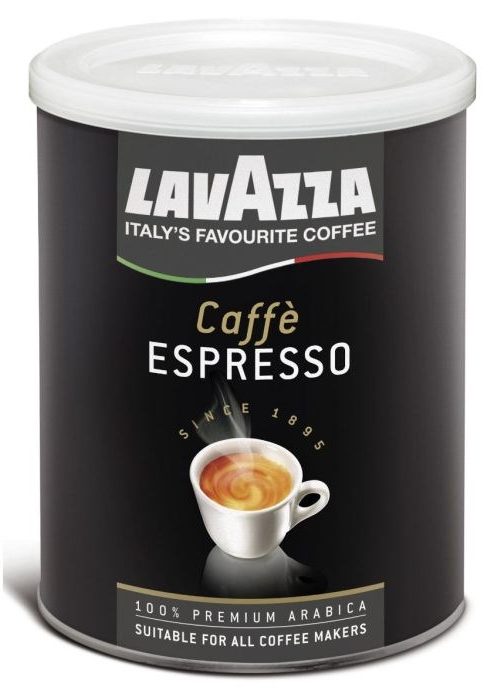
A mixture of Arabica beans, collected in 6 regions of Central America, Brazil, Africa. Slow heat treatment of coffee fruits allows you to maintain a rich, bright taste. The grains are filled in metal cans, and instead of air, the free space is filled with inert gas - this increases the shelf life.
Produced in Italy, a package of 1 kg costs 1290 rubles. recommended for coffee machines.
Advantages:
- great espresso;
- affordable price.
Disadvantages:
- not found.
Strong roast
When deeply roasted, the beans are dark brown in color, with slight oily spots. French roast is a European qualification. There is also a higher degree - this is Spanish or dark French.
Dessert Cup
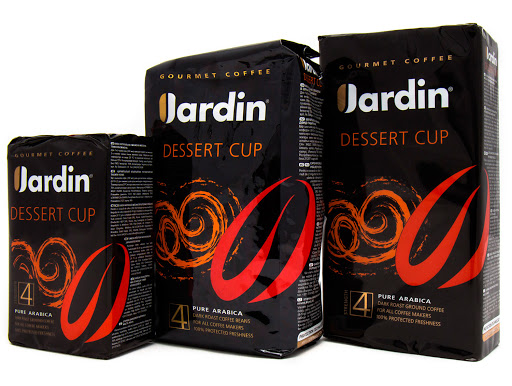
A balanced combination of selected grains from Central America and Africa. The coffee is roasted using Thermo Two technology (drum roasting with convection), which allows you to get an even roast with preservation of aroma. The brewed coffee is rich with a noble fruity acidity, and the honey-bitter aftertaste is filled with the aroma of a dessert.
Jardin coffee packaging without air access Oxygen free. Cost of 500 g - 461 rubles.
Advantages:
- invigorating taste of brewed coffee;
- price.
Disadvantages:
- not.
Illy dark
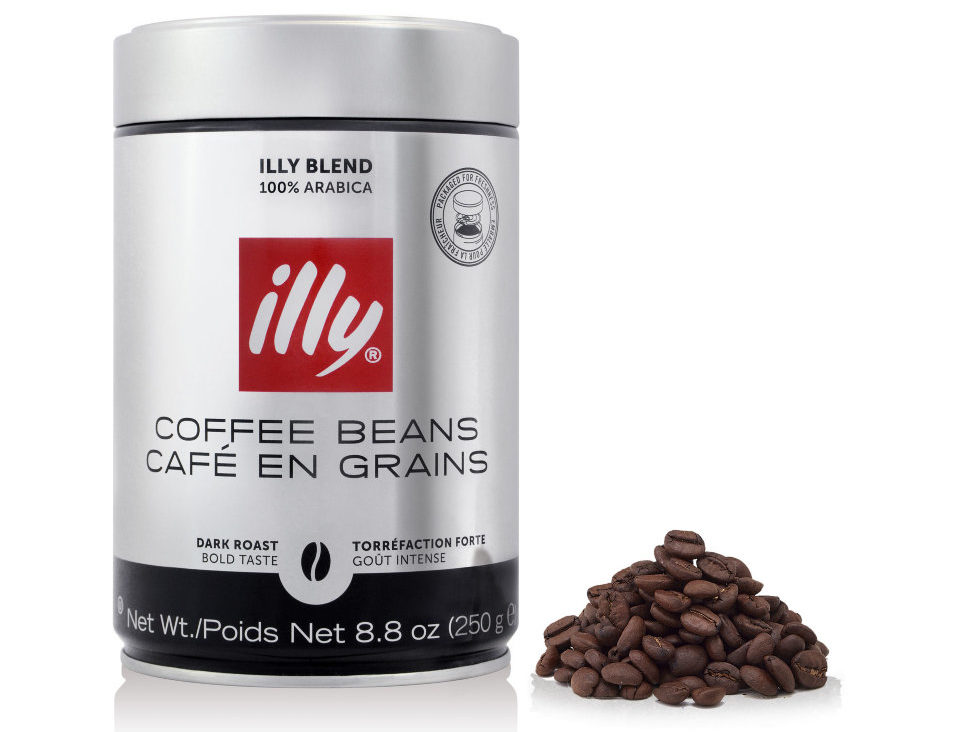
Selected 9 varieties of Arabica coffee beans with dark roast. This gives Italian coffee a rich, deep flavor with a chocolatey aftertaste. The coffee is sealed in an airtight package using an original pressurization method that allows you to preserve the unique taste of Illy coffee.
The cost of a can of 250 g is 619 rubles.
Advantages:
- rich taste;
- affordable price.
Disadvantages:
- Not found.
Barista Art Botticelli
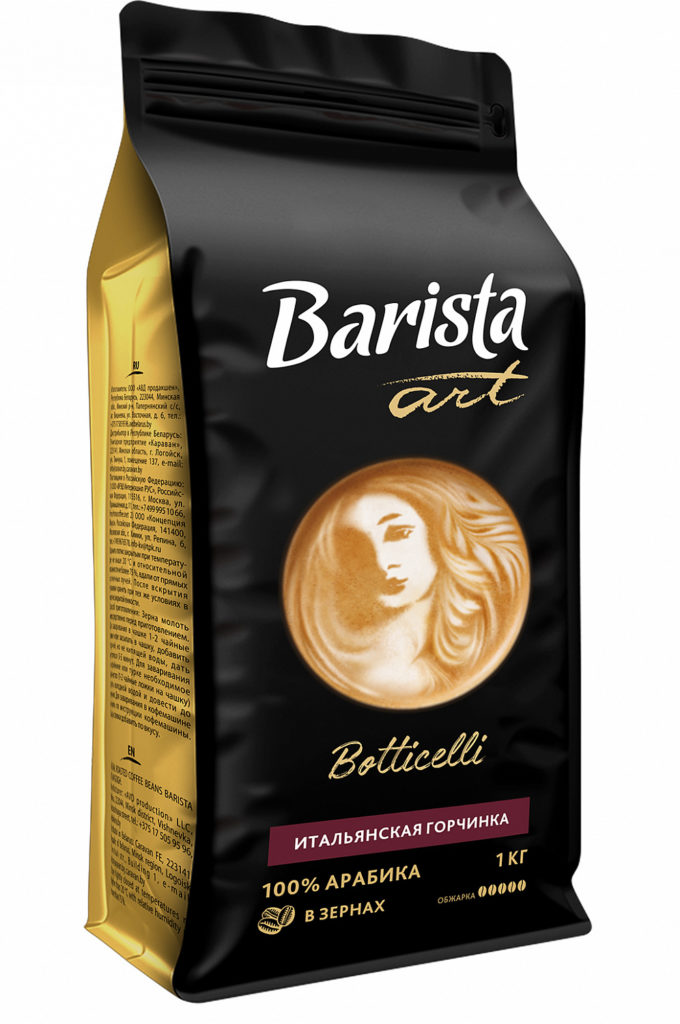
Barista is the largest supplier of green coffee to the Republic of Belarus. The company's specialists examine the quality of the fruit in the laboratory and control the entire roasting process.
Art Botticelli coffee beans are grown in Brazil and Ethiopia and have a dark roast. The brewed coffee tastes like chocolate, vanilla, nuts and caramel with a cocoa aftertaste. It is used for making Americano, espresso. Soft packaging with a degassing valve.
The cost of 1 kg is 1250 rubles.
Advantages:
- pleasant taste and aftertaste;
- convenient packaging.
Disadvantages:
- Not found.
Julius Meinl Wiener Mokka
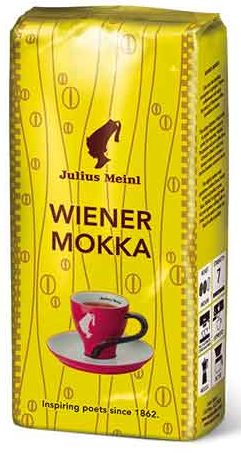
"Vienna Mocha" from the Austrian company Julius Meinl is 100% Arabica from Brazilian plantations. The dark Viennese roast gives the drink an intense flavor and nutty creamy foam. The coffee beans are vacuum packed.
A package of 250 g costs 537 rubles.
Advantages:
- rich taste of prepared coffee;
- quality grains.
Disadvantages:
- not.
Coffee is a drink, without which many people cannot imagine their morning breakfast. We hope that our article has helped to learn something new about the drink and taste elite, unique varieties of Arabica.












